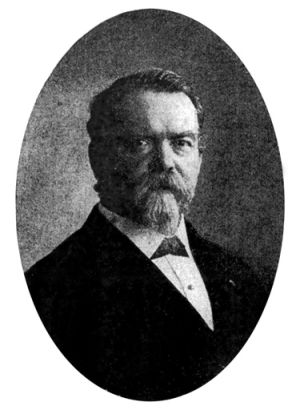Frank O'Brien
Frank P. O'Brien, sometimes spelled O'Brine (born February 29, 1844 in Dublin, Ireland; died September 12, 1910 in Birmingham) was a builder and early civic leader of Birmingham, serving on the Board of Aldermen, as Jefferson County Sheriff, in the Alabama House of Representatives and as Mayor of Birmingham.
Youth and early career
O'Brien was born in Dublin to Michael O'Brien, a teacher and former priest in training from Limerick and the former Mary Corcoran. The family emigrated to the United States in 1848 and first settled in Honedale, Pennsylvania, and later Scranton, where Michael O'Brien was appointed superintendent of the Diamond Mines. Frank left his family at the age of 14 and apprenticed as a scenic painter under Peter Schmidt, assisting him in the painting of murals at the Montgomery Theatre in Montgomery in 1859. In 1861 at the outbreak of Civil War he joined up with the Independent Rifles which became briefly attached to the 2nd Alabama Regiment. He later enlisted in the Montgomery Blues assigned to the 3rd Alabama Infantry Regiment and commanded a scout patrol for the next two years. He was wounded at the Battle of Little Washington and again at the 2nd Battle of Plymouth, North Carolina where he was captured and held captive from December 12, 1864 to February 1865. He married Indiana "Dannie" McBride, daughter of Montgomery physician Andrew McBride, on October 11, 1865. They had five children: Nettie, Anna, Margaret, Bossie, and Frank, Jr (who died in infancy).
Birmingham
O'Brien was one of the first people to reside in the newly-founded City of Birmingham in June 1871 and soon made himself known as a leading citizen and builder, at one point employing nearly 350 men. His company was engaged to construct the Birmingham Rolling Mill as well as numerous coking ovens for the Pratt Coal and Coke Company and Alice Furnace.
O'Brien planned and developed Sublett Hall, the city's first playhouse and meeting hall in 1872. He painted the scenery himself and acted as promoter for the next two years. He also opened a planing mill which produced much of the wood sash and door trim used in the early buildings of the city. He expanded the business with the operation of Alabama's first steam-powered brick-making machine. As a member of the second Board of Aldermen, he stayed in the city and was involved with helping the victims of the 1873 cholera epidemic and nearly died from the disease himself.
Before the end of his two-year term, O'Brien resigned from the Board of Aldermen to attend to his growing private business interests. In 1875 he served on the committee that helped establish the Experimental Coke and Iron Company that demonstrated the viability of Birmingham's mineral resources for ironmaking. O'Brien was contracted to construct the coke ovens at the rebuilt Oxmoor Furnace, which went into blast the following February. In 1879 he was among the charter directors of the Birmingham Gas Company.
Opera House
Though once a business failure to the tune of $62,000, O'Brien made good all his debts and eventually enjoyed healthy returns on his investments in Birmingham real estate. He built the 1,266-seat O'Brien Opera House on the site of a former sawmill opposite what was then a cornfield on the corner of 1st Avenue North and 19th Street in 1882. An active promoter of high-class theater in what was otherwise a rough and tumble city, O'Brien served as vice president of the Southern Theatrical Circuit, a network of 33 opera houses and theaters.
Press and politics
He later purchased the morning Birmingham Iron Age which he published, sometimes at a loss, as part of his efforts to boost civic feeling. He sold the paper later to W. P. Pinckard. In the mid-1890s he served in the Alabama House of Representatives. In 1893 he was counted among the founding trustees of the Birmingham Dental College and a year later among the regents of the Birmingham Medical College.
Continually active in Democratic politics, O'Brien campaigned for New York Senator David Hill in the 1892 presidential election and for Grover Cleveland in 1896. He told a reporter for The New York Times that the Southern delegation to the 1896 convention would strongly favor a "sound currency" (against Benjamin Harrison's policy of restricting the free coinage of silver).
O'Brien was Jefferson County Sheriff from 1896 to 1900. He ran unsuccessfully for mayor against incumbent George Ward in the 1907 mayoral election. He was elected in the 1909 Birmingham mayoral election and served most of one term as mayor, before his death in 1910. He supported the Greater Birmingham proposal to bring outlying suburbs into the city, but did not live to see it pass in the legislature. He is buried at Oak Hill Cemetery.
| Preceded by: George Morrow |
Jefferson County Sheriff 1896–1900 |
Succeeded by: Andrew Burgin |
| Preceded by: George Ward |
Mayor of Birmingham 1909–1910 |
Succeeded by: Culpepper Exum |
References
- Dubose, John Witherspoon (1887) Jefferson County and Birmingham, Alabama: Historical and Biographical Birmingham: Teeple & Smith, Publishers; Caldwell Printing Works.
- Cruikshank, George H. (1920) History of Birmingham and Its Environs: A Narrative Account of Their Historical Progress, Their People, and Their Principal Interests 2 volumes. Chicago, Illinois: Lewis Publishing Company. - via Birmingham Public Library Digital Collections
- Owen, Thomas McAdory and Marie Bankhead Owen (1921) History of Alabama and Dictionary of Alabama Biography. 4 volumes. Chicago, Illinois: S. J. Clarke Publishing Co.
- Chiles, Ruth (1936) "The Birmingham Theatres, 1886-1900". M.A. thesis, Birmingham-Southern College
